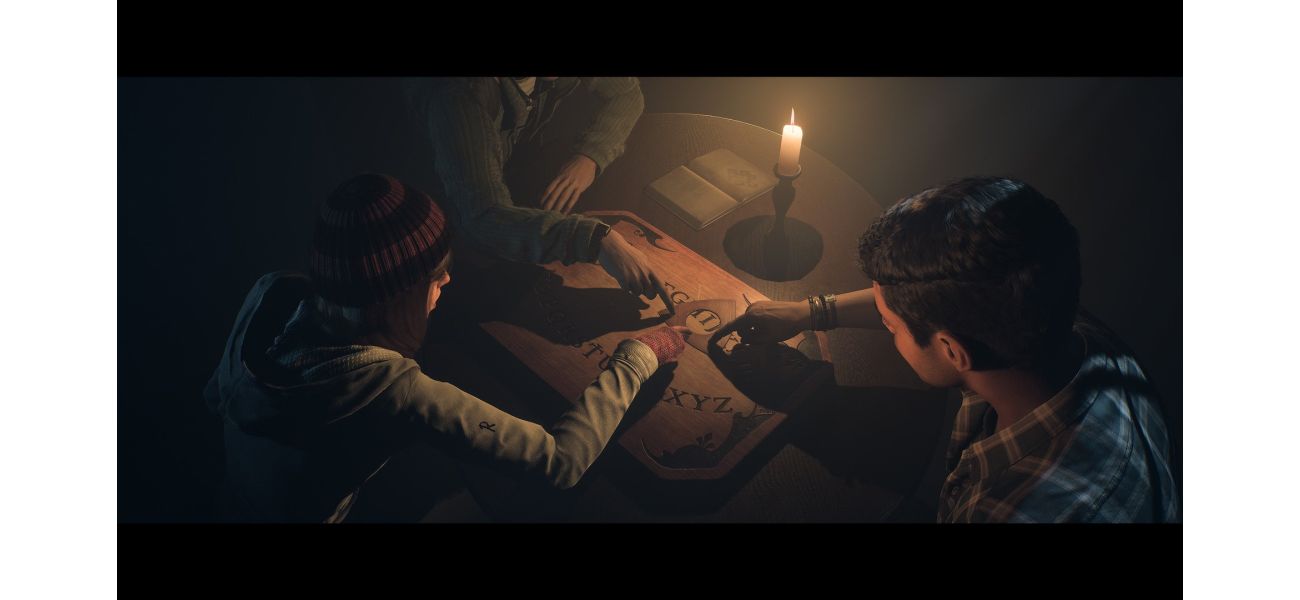A review of Until Dawn PS5, deemed the most unnecessary remake in the world.
Sony's iconic horror game gets a makeover for PS5, but it may not be the ultimate version.
October 10th 2024.

Have you heard about the latest re-release of Until Dawn? Yes, you read that right. Sony has decided to bring back their iconic interactive horror movie for the PlayStation 5, but the end result may not be what fans were hoping for.
I know, I know. With so many remakes popping up lately, it's easy to become skeptical and assume they're all just shameless money grabs. But let's not be so quick to judge. After all, remakes like Resident Evil 4 and Final Fantasy 7 Rebirth have proven to be some of the best games of this generation. And let's not forget the recent success of Silent Hill 2's remake, which surpassed all expectations.
Typically, remakes are best utilized for games that didn't quite reach their full potential the first time around. However, this is rarely the case as most remakes are of beloved classics. Until Dawn falls into a different category altogether. While it may not be considered a classic, it did achieve what it set out to do and helped establish a whole sub-genre of horror-themed interactive movies.
We have to admit, the original had its flaws, especially when it came to delivering genuine horror. But unlike most interactive movies, we still enjoyed the ride for what it was. However, a full-scale remake was not something we were eagerly anticipating. Yet, that's exactly what we got. This is not a remaster, my friends. This is an entirely new game, created from scratch with supposedly better graphics. But here's the thing – the original is only nine years old and works perfectly fine on the PlayStation 5. So, why the need for a remake?
This isn't the first time Sony has pulled this move. Remember their remake of The Last of Us Part 1, even though the PlayStation 4 remaster was already visually stunning? It seemed like a waste of time and resources, even if it was meant to coincide with the TV show. And now, we have the same situation with Until Dawn. Is it because a movie based on the game is in the works? Maybe. But let's not forget that Sony had a falling out with Supermassive Games, the original developers, so it's unlikely they will be involved in any future games – just like they weren't with this remake.
It's hard to talk about Until Dawn without mentioning its inspiration, the low budget 80s horror movies. However, this is not your typical survival horror game. It's not overly gory, and it doesn't aim to scare you out of your wits. Instead, it settles for a more audience-friendly level of spookiness.
Now, I know that doesn't sound very appealing, but trust me, it's difficult to dislike this game. Part of the reason for this is the talented cast, which includes Hayden Panettiere from Heroes and Scream, and a pre-fame Rami Malek. They all give their best performances, despite the sometimes lackluster dialogue. But the real appeal of Until Dawn lies in its central premise – you control your character's actions and make crucial decisions that can drastically change the outcome of the game. And towards the end, one wrong move can result in the death of a character.
Speaking of which, the remake introduces some new endings, hinting at a possible sequel. So, for fans who wanted more from the franchise, this may come as a pleasant surprise. However, it's worth noting that Sony and Supermassive Games seem to have parted ways, so it's uncertain if the developers will be involved in any future projects.
But let's talk about the remake itself. It's challenging to pinpoint exactly why it was made, but one factor could be the desire to improve the game's graphics. However, despite using Unreal Engine 5 and having more realistic lighting and snow effects, the overall aesthetic is a bit lacking. The original's bleak, horror atmosphere has been replaced with a golden hue, making it less atmospheric.
Another questionable decision was to remove the fixed camera angles that were present in the original. While this may have worked for Silent Hill 2, it doesn't quite have the same effect here. In fact, it takes away from the game's cinematic feel, which was one of its main selling points. And to make matters worse, the characters control in a sluggish manner, and you can no longer run freely.
But the most significant issue with the remake is its performance. While the original, when played on PlayStation 5, runs at 60fps, the remake struggles to maintain a consistent 30fps and has even crashed multiple times. Hopefully, these issues will be addressed in a future patch, but it's disheartening to see a remake fail at its one job – improving upon the original.
Who would have thought that we would see a remake of Sony's interactive horror movie, Until Dawn, for the PlayStation 5? As much as we may have our doubts about remakes, there have been some incredible ones, such as Resident Evil 4 and Final Fantasy 7 Rebirth, which turned out to be some of the best games of their generation. And let's not forget the recent success of Silent Hill 2, which proved that remakes can be a triumph.
Remakes are usually meant to improve upon the original and fulfill its potential. However, this is not the case with Until Dawn, as it was already a successful and groundbreaking game that helped establish the horror-themed interactive movie genre. While it may not be considered a classic, it still did everything it set out to do and provided an enjoyable experience for players.
Despite its flaws, we appreciated the original game for what it was and didn't see the need for a full-scale remake. Yet, here we are with a complete new game, created from scratch with supposedly improved graphics. It's worth noting that the original version was only released nine years ago and already works perfectly fine on the PlayStation 5. So, one might wonder, why was this remake necessary?
This is not the first time Sony has done something like this. They recently remade The Last Of Us Part 1 for the PlayStation 5, despite the remastered version already looking great. While there may have been some valid reasons for this, it still felt like a waste of time and resources. The same can be said for Until Dawn, which seems to have gotten the same treatment for unknown reasons.
One possible explanation for this remake could be the upcoming Until Dawn movie. However, unlike the successful The Last Of Us TV show, it's uncertain how well the movie will do. Regardless of the reasoning behind the remake, it does offer some new endings that hint at a potential sequel, which may be exciting for fans of the franchise. However, it's unlikely that the original developer, Supermassive Games, will be involved, as they have had a falling out with Sony.
While Until Dawn draws inspiration from low budget 80s horror movies, it's not your typical survival horror game. It's not excessively gory or terrifying, but rather settles for a more mild and audience-friendly spookiness. Despite that, the game is difficult to dislike, thanks to its talented cast, including Hayden Panettiere and Rami Malek, who give their all with the sometimes lackluster dialogue.
The game's central premise is what makes it stand out - the player controls the characters directly, but the most crucial decisions are made through on-screen choices with only two or three options. These decisions can have significant consequences, sometimes resulting in the death of a character. This adds to the game's tension and suspense, and while it may not be a flawless system, it works well enough.
The remake has made some minor improvements to the original game, but it still has some rough edges. It's challenging to tell how much has changed, given the many different story branches. However, the most significant change is the graphics, which, surprisingly, seem to have gotten worse. While the technical aspects may have improved, the overall atmosphere is not as bleak and eerie as the original.
It's also puzzling why the fixed camera angles were removed from the remake. While it may have worked for Silent Hill 2, it takes away from the cinematic experience that Until Dawn was known for. Additionally, the characters' movements feel sluggish, and the ability to run has been restricted to specific story moments. The most significant issue with the new graphics is the poor performance, with frequent frame rate drops and crashes.
In conclusion, the Until Dawn remake may have been unnecessary and has not lived up to its potential. While it offers some new endings and hints at a sequel, it falls short in terms of graphics and performance. It's a shame that the remake couldn't deliver on the expectations set by the original game, leaving us to wonder, who asked for this?
I know, I know. With so many remakes popping up lately, it's easy to become skeptical and assume they're all just shameless money grabs. But let's not be so quick to judge. After all, remakes like Resident Evil 4 and Final Fantasy 7 Rebirth have proven to be some of the best games of this generation. And let's not forget the recent success of Silent Hill 2's remake, which surpassed all expectations.
Typically, remakes are best utilized for games that didn't quite reach their full potential the first time around. However, this is rarely the case as most remakes are of beloved classics. Until Dawn falls into a different category altogether. While it may not be considered a classic, it did achieve what it set out to do and helped establish a whole sub-genre of horror-themed interactive movies.
We have to admit, the original had its flaws, especially when it came to delivering genuine horror. But unlike most interactive movies, we still enjoyed the ride for what it was. However, a full-scale remake was not something we were eagerly anticipating. Yet, that's exactly what we got. This is not a remaster, my friends. This is an entirely new game, created from scratch with supposedly better graphics. But here's the thing – the original is only nine years old and works perfectly fine on the PlayStation 5. So, why the need for a remake?
This isn't the first time Sony has pulled this move. Remember their remake of The Last of Us Part 1, even though the PlayStation 4 remaster was already visually stunning? It seemed like a waste of time and resources, even if it was meant to coincide with the TV show. And now, we have the same situation with Until Dawn. Is it because a movie based on the game is in the works? Maybe. But let's not forget that Sony had a falling out with Supermassive Games, the original developers, so it's unlikely they will be involved in any future games – just like they weren't with this remake.
It's hard to talk about Until Dawn without mentioning its inspiration, the low budget 80s horror movies. However, this is not your typical survival horror game. It's not overly gory, and it doesn't aim to scare you out of your wits. Instead, it settles for a more audience-friendly level of spookiness.
Now, I know that doesn't sound very appealing, but trust me, it's difficult to dislike this game. Part of the reason for this is the talented cast, which includes Hayden Panettiere from Heroes and Scream, and a pre-fame Rami Malek. They all give their best performances, despite the sometimes lackluster dialogue. But the real appeal of Until Dawn lies in its central premise – you control your character's actions and make crucial decisions that can drastically change the outcome of the game. And towards the end, one wrong move can result in the death of a character.
Speaking of which, the remake introduces some new endings, hinting at a possible sequel. So, for fans who wanted more from the franchise, this may come as a pleasant surprise. However, it's worth noting that Sony and Supermassive Games seem to have parted ways, so it's uncertain if the developers will be involved in any future projects.
But let's talk about the remake itself. It's challenging to pinpoint exactly why it was made, but one factor could be the desire to improve the game's graphics. However, despite using Unreal Engine 5 and having more realistic lighting and snow effects, the overall aesthetic is a bit lacking. The original's bleak, horror atmosphere has been replaced with a golden hue, making it less atmospheric.
Another questionable decision was to remove the fixed camera angles that were present in the original. While this may have worked for Silent Hill 2, it doesn't quite have the same effect here. In fact, it takes away from the game's cinematic feel, which was one of its main selling points. And to make matters worse, the characters control in a sluggish manner, and you can no longer run freely.
But the most significant issue with the remake is its performance. While the original, when played on PlayStation 5, runs at 60fps, the remake struggles to maintain a consistent 30fps and has even crashed multiple times. Hopefully, these issues will be addressed in a future patch, but it's disheartening to see a remake fail at its one job – improving upon the original.
Who would have thought that we would see a remake of Sony's interactive horror movie, Until Dawn, for the PlayStation 5? As much as we may have our doubts about remakes, there have been some incredible ones, such as Resident Evil 4 and Final Fantasy 7 Rebirth, which turned out to be some of the best games of their generation. And let's not forget the recent success of Silent Hill 2, which proved that remakes can be a triumph.
Remakes are usually meant to improve upon the original and fulfill its potential. However, this is not the case with Until Dawn, as it was already a successful and groundbreaking game that helped establish the horror-themed interactive movie genre. While it may not be considered a classic, it still did everything it set out to do and provided an enjoyable experience for players.
Despite its flaws, we appreciated the original game for what it was and didn't see the need for a full-scale remake. Yet, here we are with a complete new game, created from scratch with supposedly improved graphics. It's worth noting that the original version was only released nine years ago and already works perfectly fine on the PlayStation 5. So, one might wonder, why was this remake necessary?
This is not the first time Sony has done something like this. They recently remade The Last Of Us Part 1 for the PlayStation 5, despite the remastered version already looking great. While there may have been some valid reasons for this, it still felt like a waste of time and resources. The same can be said for Until Dawn, which seems to have gotten the same treatment for unknown reasons.
One possible explanation for this remake could be the upcoming Until Dawn movie. However, unlike the successful The Last Of Us TV show, it's uncertain how well the movie will do. Regardless of the reasoning behind the remake, it does offer some new endings that hint at a potential sequel, which may be exciting for fans of the franchise. However, it's unlikely that the original developer, Supermassive Games, will be involved, as they have had a falling out with Sony.
While Until Dawn draws inspiration from low budget 80s horror movies, it's not your typical survival horror game. It's not excessively gory or terrifying, but rather settles for a more mild and audience-friendly spookiness. Despite that, the game is difficult to dislike, thanks to its talented cast, including Hayden Panettiere and Rami Malek, who give their all with the sometimes lackluster dialogue.
The game's central premise is what makes it stand out - the player controls the characters directly, but the most crucial decisions are made through on-screen choices with only two or three options. These decisions can have significant consequences, sometimes resulting in the death of a character. This adds to the game's tension and suspense, and while it may not be a flawless system, it works well enough.
The remake has made some minor improvements to the original game, but it still has some rough edges. It's challenging to tell how much has changed, given the many different story branches. However, the most significant change is the graphics, which, surprisingly, seem to have gotten worse. While the technical aspects may have improved, the overall atmosphere is not as bleak and eerie as the original.
It's also puzzling why the fixed camera angles were removed from the remake. While it may have worked for Silent Hill 2, it takes away from the cinematic experience that Until Dawn was known for. Additionally, the characters' movements feel sluggish, and the ability to run has been restricted to specific story moments. The most significant issue with the new graphics is the poor performance, with frequent frame rate drops and crashes.
In conclusion, the Until Dawn remake may have been unnecessary and has not lived up to its potential. While it offers some new endings and hints at a sequel, it falls short in terms of graphics and performance. It's a shame that the remake couldn't deliver on the expectations set by the original game, leaving us to wonder, who asked for this?
[This article has been trending online recently and has been generated with AI. Your feed is customized.]
[Generative AI is experimental.]
0
0
Submit Comment





